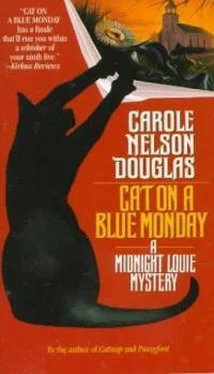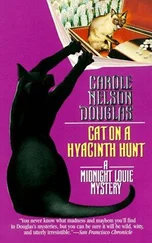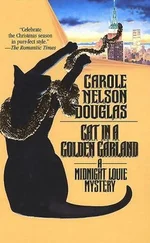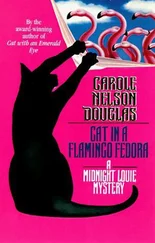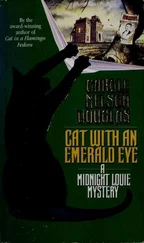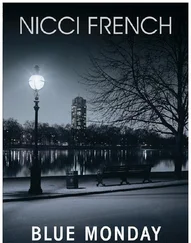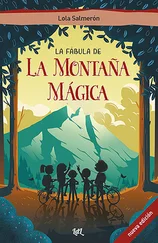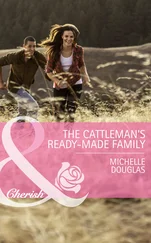"Sounds like you were the apple of the whole family's eye.
"Yup, My father called me 'Ladybug' till l left home. And when I flew away from home and left Minneapolis with Max--they went ballistic."
"They sound a little smoth ering. Try to direct your frus tration with your family in to what we're doing here. Redi rect the irritation into action. A nd remember, I 'm not going into the 'Kong F u' mystical s tuff. These are just some moves you can use to get an attacker off balance."
"Will I be able to throw you over my shoulder?"
"Eventually," he promised with a smile.
She sighed, looked around again for witnesses, found none, and then gr imaced. "Just don't call me 'Grasshopper.' "
Temple padded barefoot int o the Circle Ritz and up to her apartment. She hated to "pad. " It made her feel like a child who'd gotten out of bed to ask for a glass of water, like she had to ask permission of someone for whatever she wanted.
Matt had been right. She was more deeply irritated by her family's over protectivene ss than she knew. When she drew on that ancient annoyanc e, pretending to be Nancy Ninja didn't feel that weird. Not that she'd get to the stage of tossing him that quickly.
In her bedroom she fought the fabric knot and won, Round One for the lit tle lady in bare feet. When she shrugged off the--wha t was it, a uniform, a costume?--Gi, the unfurling fabric released th e scent of her own sweat, faint and plea santly pungent rather than reek ing.
Temple changed into aqua knit shorts and top, and then slid her bare feet into cork-soled wedgies two-and-a-half-inches high at the h eel. Did she feel more self-confi dent-- any more vindicated, or vindictive? Had she made a breakthrough in her slo-mo relationship with her attractive but elusive neighbor? Maybe.
She walked to the bedroom /off ice at the unit's other end, detouring through the kitchen to snag a glass of Ruby Red grapefruit juice. Visions of chopping a thug in the bridge of his nose with the hardened edge of one hand, then jamming the heel of the other hand under his nostrils so the presumably broken bridge bone would drive, splintering, into his brain, burned as gory-red in her head as the grapefruit juice in her hand.
Matt wasn't teaching her that maneuver, but she'd heard of it. Maybe going through the motions now, learning the moves that she hadn't known when the two men had attacked her, would restore something they had taken. Maybe, at her desk, a pale-pink Post-it note with the group-therapy phone number stuck out from the top of her computer screen like an anemic tongue.
She ripped it off, then lifted the phone and dialed. Maybe going through the motions of anything--even survival---wasn't enough.
Chapter 3
A Hiss in the Night
Midnight Louie was waiting for Matt Devine at the corner of the Strip and Charleston when he walked to work that evening.
Matt always walked to work. First and foremost, he didn't own a car; second, his job was to sit still and listen to whatever misery poured out over the phone lines from seven at night to three in the morning. Those were the hours that Las Vegas glistened at its most garish, when the most angst overflowed lowball glasses and lonely hotel rooms and human psyches.
Matt sometimes considered himself a silent butler, sweeping up the ashes of other people's lives.
"Hey, Louie," he said in greeting.
Not many black cats hung out in Las Vegas, which was a risky venue for a bad-luck symbol as old as superstition itself. Only one acted like he owned the place--any place he happened to be.
Of course Midnight Louie wasn't waiting for him. The cat was a roamer by nature and their paths had happened to cross this one time. Still, Louie must have recognized Matt, for he began trotting along behind him as if in search of a treat.
Matt glanced up at the cliff side of massive hotel facades set well back from the rush-hour Strip fl owing with eight lanes of hot, semi-stalled metal. He spotted the relatively modest outline of the Crystal Phoenix, its neon spray of the legendary bird glowing faint against a still sun washed sky.
Matt turned clown a street, appropriately named Shadow, into thinning crowds. Louie kept pace with a businesslike trot more common to dogs than to cats, but then, Louie was an uncommon cat. At least he seemed to think so.
"Temple will be worried to hear you were so far from home," Matt found himself telling the cat, as if it were a dog, as if people could really communicate with either species.
Matt was used to living alone, having even a silent partner to talk to was a nice change.
Down the block, a modest shopping center crouched only blocks behind the Strip's high-profile glitz. Matt sometimes thought the Las Vegas Strip was a gigantic Hollywood set, that all the hotel fronts were hollow behind, propped up by long aluminum poles, and that the people streaming into the lavish facades disappeared into a Twilight Zone where everything that happened was one long Technicolor, computer-enhanced hallucination.
Where he was heading was no hallucination. A homemade sign reading "ConTact" covered what had been a dry cleaner's until eight months before.
Louie was still running with him. Behind them, the sun burned Matt's shoulders even as it slipped beneath the rocky eleven-thousand-foot facade of Charleston Peak and its neighboring mountains. Maybe they were delusions, too. The desert was famous for mirages.
Matt opened the door, felt the air-conditioned coolness hush out at him. Midnight Louie bent to sniff the threshold.
"Corning in?"
The cat stepped back, shook its foot, and remained outside.
"Got company?" Sheila glanced up from her phone niche.
"Just a cat," Matt let the vaguely smudged glass door close behind him on its slow automatic swing so like a sigh. Louie regarded him gravely through the glass, then turned and trotted away. "It belongs to one of my neighbors."
"He lets it roam this far?" Sheila sounded surprised.
"Temple doesn't have much to say about it. The cat adopted her and apparently is used to keeping his own hours."
Sheila slid him a glance at the mention of "her." Matt had seen that look a thousand times before, the quick speculation whenever he mentioned a woman. And how did Sheila know how far away he lived?
Sheila Pulanski. She had a master's in social work and a bland manner that did nothing to overcome a personality as dishwater-dull as her hair, her slightly pocked skin, her resigned, rain-puddle-gray eyes. Yet she still wanted to know what women Matt Devine knew, and how, and how many, and what "she"--or they--were to him.
Those assessing glances always disappointed him, made him tense in some ancient form of defense, defense from what? Speculative glances? Women? Or just the damn predictability of it? He couldn't help what he looked like.
He went quickly to his own phone niche. Like all nonprofit hotlines, ConTact was an ever-needy organization. When a local high school donated part of an outmoded language-lab setup, the board of directors had jumped at it. So the office didn't look like much, no more than a boiler room telephone sales operation, with each counselor drawing a chair up to a table sheltered by a three-sided barrier covered in white, sound-absorbent tiles drilled with ranks of small, dark holes.
Matt pulled his chair close to the table and lifted his headset off the aluminum hook jammed into one of the convenient holes. The soft, gray-foam pads settled on his ears like a comforting muffler. He was connected to the night again, to the anonymous callers, to the surge and fall of need all around him, all around everyone if they would only listen for the constant, surf like hiss of agony pulling back and hurling forward in endless conflict: Help me. No, stay away! Just talk to me, please. No, don't tell me to leave, let go, escape, grow up, go to group. Help me.
Читать дальше
